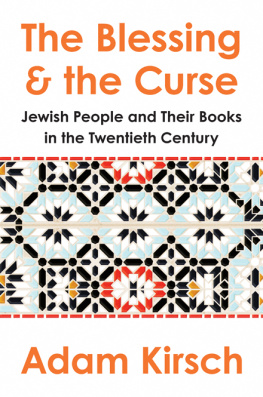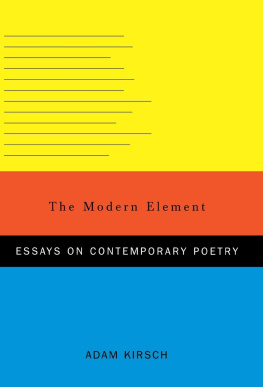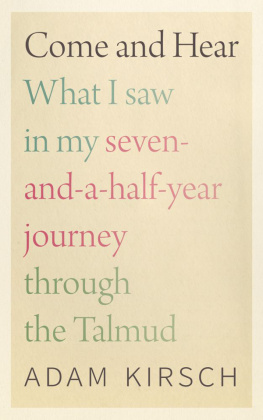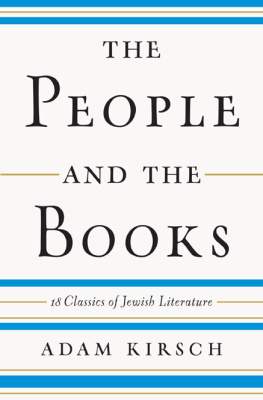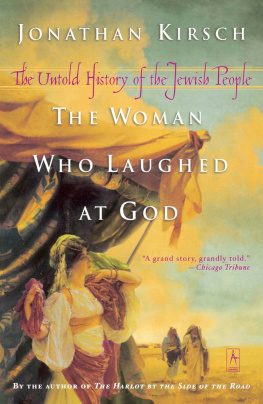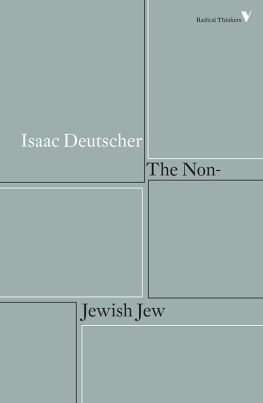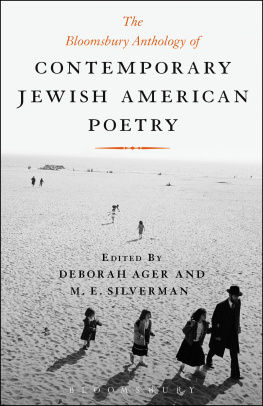Who Wants to Be a Jewish Writer?
Who Wants
to Be a Jewish
Writer?
And Other Essays
Adam Kirsch

Published with assistance from the Mary Cady Tew Memorial Fund.
Copyright 2019 by Adam Kirsch.
All rights reserved.
This book may not be reproduced, in whole or in part, including illustrations, in any form (beyond that copying permitted by Sections 107 and 108 of the U.S. Copyright Law and except by reviewers for the public press), without written permission from the publishers.
Yale University Press books may be purchased in quantity for educational, business, or promotional use. For information, please e-mail (U.K. office).
Set in Janson type by Integrated Publishing Solutions, Grand Rapids, Michigan.
Printed in the United States of America.
Library of Congress Control Number: 2018953596
ISBN 978-0-300-24013-9 (hardcover : alk. paper)
A catalogue record for this book is available from the British Library.
This paper meets the requirements of ANSI / NISO Z39.48-1992
(Permanence of Paper).
10 9 8 7 6 5 4 3 2 1
Contents
Preface
More and more mankind will discover that we have to turn to poetry to interpret life for us, to console us, to sustain us. Without poetry, our science will appear incomplete; and most of what now passes with us for religion and philosophy will be replaced by poetry. When Matthew Arnold offered this formulation of the duty, and opportunity, of modern poetry, he was expressing a distinctively Victorian blend of optimism and despair. The sages of the nineteenth century believed that religion was on the way out of human civilization, its vision of the world made obsolete by modern science. This was a fearful prospect, since religion had always been humanitys best source of moral and metaphysical guidance. Without it, wouldnt we be set adrift, spinning in a directionless void, as Nietzsche wrote in his parable of the madman? If the beauty, mystery, and meaning of existence depend on religious belief, then a world without God would have to be as mournful as Thomas Hardys poem Gods Funeral:
So, toward our myths oblivion,
Darkling, and languid-lipped, we creep and grope
Sadlier than those who wept in Babylon,
Whose Zion was a still abiding hope.
But Arnold holds out the promise that humanity can learn to compensate for Gods absence. After all, if God can disappear, that means he was always just a creation of human imagination; and if we could imagine God, why shouldnt we be able to imagine his replacement? For Arnold, as a not uncritical follower of the Romantic tradition of William Wordsworth and Percy Bysshe Shelley, it was poetry that offered the purest expression of human imagination. It would be up to the great poets of the future to reconcile humanity to a godless existence, by proving that such an existence could be just as rich in meaning. A new world would look to the poet not merely for new epics and lyrics, but for new myths: We should conceive of [poetry] as capable of higher uses, and called to higher destinies, than those which in general men have assigned to it hitherto, Arnold wrote.
Almost a century and a half later, it is clear that his prediction was both right and wrong. Arnold was right that human beings cannot live without myths to console us and sustain us, but he was wrong to think that poetry would be able to supply those myths. For a myth functions only if people can believe it is true, and to call something a poem is already to relegate it to the realm of untruth, of mere imagination. The reactionary poet and critic T. E. Hulme described Romanticism, contemptuously, as spilt religion, and religion is not usable if it is spilled; it has to be concentrated into ritual and doctrine if it is to serve any purpose. That is why the really effective myths in the twentieth century would be lies that insisted they were not lies, such as fascism and communism. And compared with those poems of the actual, the traditional religious myths that Arnold believed were obsolete start to look pretty reasonable and humane. At the very least, they preserve space for the sanctity of human life and for a recognition of mystery and limit. Perhaps that is why humanity now seems to be returning to the old monotheisms.
The result is that, in the twenty-first century, we have a situation not unlike the one Arnold knew: an educated class that is skeptical of religion, uneasily facing a majority that continues to live on terms defined by religion. And it is safe to say that poets, who in America are a subdivision of the academic intelligentsia, mainly fall on the skeptical side of this divide. There are very few poets writing traditional religious verse today, at least not in the professional literary world, and those who do tend to approach faith in the hypothetical, metaphorical fashion of liberal theologians. Poetry commands too small an audience to be able to offer the kind of sustenance and consolation Arnold believed it could provide to humanity.
But this shrinking of poetrys social mission provides, in turn, new possibilities for writers and readers. For there is still a deep affinity between poetry and religion, though today we might no longer think of it as having to do with the creative power of the imagination. Rather, what poetry and religion have in common is that they are both idioms in which we can talk seriously about the things that matter most. For this purpose, it may not be very important whether a poet believes she is talking to herself, to a small audience of readers, or to God. In his post-religious poem Church-Going, Philip Larkin wrote that, even to an unbeliever, a church has value as a serious house on serious earth. In the same sense, poetry is serious language, which stands on religious grounds even when it is not the work of a believer.
To think about poetry and religion in this way is implicitly to favor certain kinds of each. I have always been drawn to people, in life and on the page, for whom religion is a live issue, an open question, rather than something to be either automatically dismissed or automatically obeyed. Possibly for the same reason, the poetry that matters most to me involves a kind of personal risk, a putting of the self at stake, in ways that run deeper than autobiographical confession. I like writers who are ironical about themselves; who know that a formal statement of beliefs, religious or artistic or political, can never be fully accurate or adequate; who keep being drawn back to questions that they might have believed were answered. The essays collected in this book, written over the past decade, were not written with a program in mind, but it seems to me that they converge on the intersection of poetry and religion because these are the most available languages for discussing ultimate questions.
For me, being a Jewish writer involves a consciousness that religion and poetry also have inescapable social, historical, and political dimensions. When I write about Jewish literature, it is usually these themes that I am drawn to, rather than to strictly spiritual or theological questions. This is partly because of the nature of modern Jewish literature, which is generally on uneasy terms with traditional belief and practice. It is also due to the fact that, even in a secular Western society, Jews will often find themselves outside the mainstream, politically and intellectually, in ways that seem more significant and challenging to me over time. (Larkin wrote Church-Going, but there is no classic English poem on Synagogue-Going, and if there were, it would mean something very different.)
Next page

